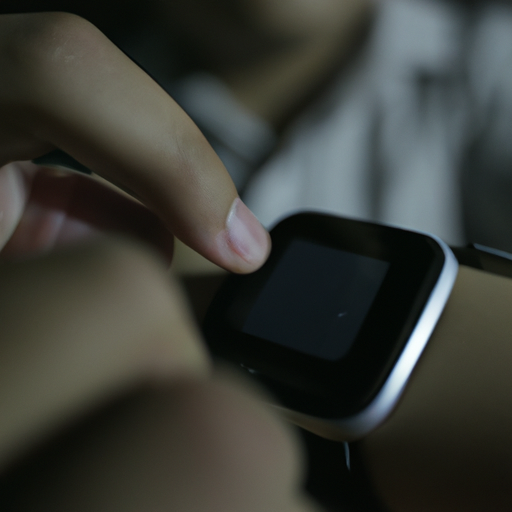Smart waches constantly monitoring our health in the future

a person wearing a smart watch connecting with friends
How Smart Watches Could Revolutionize Healthcare in the Future
Smart watches have the potential to revolutionize healthcare in the future. Smart watches are wearable devices that are equipped with a variety of sensors and other technologies that allow them to monitor and track a person’s health and fitness. They can measure heart rate, blood pressure, and other vital signs, as well as track physical activity and sleep patterns.
Smart watches can be used to monitor a person’s health in real time, allowing for early detection of potential health issues. This could be especially beneficial for those with chronic conditions, such as diabetes or heart disease, as it could allow for more timely interventions. Smart watches could also be used to remind people to take their medications or to alert them when their vital signs are out of range.
Smart watches could also be used to connect people to their healthcare providers. This could allow for remote monitoring of a person’s health, as well as the ability to send and receive messages from their healthcare provider. This could help to reduce the need for in-person visits, which could save time and money.
In addition, smart watches could be used to provide personalized health advice. For example, they could provide tailored diet and exercise recommendations based on a person’s individual health needs. This could help to improve overall health and wellness.
Overall, smart watches have the potential to revolutionize healthcare in the future. They could be used to monitor a person’s health in real time, connect them to their healthcare providers, and provide personalized health advice. This could lead to improved health outcomes and a more efficient healthcare system.
The Pros and Cons of Smart Watches Constantly Monitoring Our Health
Smart watches have become increasingly popular in recent years, with many of them now offering the ability to monitor our health. While this technology can be beneficial in many ways, it also has some potential drawbacks. In this article, we will explore the pros and cons of smart watches constantly monitoring our health.
The primary benefit of smart watches constantly monitoring our health is that it can provide us with valuable insights into our overall wellbeing. By tracking our heart rate, sleep patterns, and other vital signs, we can gain a better understanding of our health and make informed decisions about our lifestyle. Additionally, smart watches can alert us to any potential health issues, allowing us to take action before they become more serious.
On the other hand, there are some potential drawbacks to having our health constantly monitored by a smart watch. For one, the data collected by the watch may not always be accurate, leading to false alarms or incorrect readings. Additionally, the constant monitoring of our health can be intrusive and may lead to feelings of anxiety or stress. Finally, the data collected by the watch may be used by third parties, such as insurance companies, without our knowledge or consent.
In conclusion, while smart watches can provide us with valuable insights into our health, there are also some potential drawbacks to having our health constantly monitored. It is important to weigh the pros and cons carefully before deciding whether or not to use a smart watch to monitor our health.
Exploring the Ethical Implications of Smart Watches Monitoring Our Health
Smart watches have become increasingly popular in recent years, and their capabilities have grown to include monitoring our health. While this technology can be beneficial in helping us to stay healthy, it also raises important ethical questions.
One of the primary ethical concerns is the potential for data misuse. Smart watches collect a variety of data about our health, including heart rate, sleep patterns, and activity levels. This data can be used to provide us with useful insights into our health, but it can also be used for other purposes. For example, insurance companies could use this data to determine whether or not to offer coverage to an individual. This could lead to discrimination based on health data, which is a serious ethical concern.
Another ethical concern is the potential for data breaches. Smart watches store a large amount of sensitive data, and if this data were to be accessed by an unauthorized party, it could have serious consequences. This could include identity theft, financial fraud, or even physical harm. It is important that companies take steps to ensure that this data is secure and that it is only used for its intended purpose.
Finally, there is the potential for smart watches to be used to monitor people without their knowledge or consent. This could be used to track people’s movements or to monitor their health without their knowledge. This could lead to a violation of privacy and could be used to control or manipulate people.
Overall, smart watches can be a useful tool for monitoring our health, but it is important to consider the ethical implications of this technology. Companies should take steps to ensure that data is secure and that it is only used for its intended purpose. They should also ensure that people are aware of how their data is being used and that they have the ability to opt out if they choose. By taking these steps, we can ensure that smart watches are used responsibly and ethically.
How Smart Watches Could Help Us Make Better Health Decisions
Smart watches are becoming increasingly popular as a way to monitor and track our health. They offer a range of features that can help us make better health decisions.
Smart watches can track our physical activity, such as steps taken, calories burned, and heart rate. This data can be used to set goals and track progress towards them. For example, if you want to increase your daily step count, you can set a goal and track your progress over time. This can help motivate you to stay active and reach your goals.
Smart watches can also track sleep patterns. This data can be used to identify any potential sleep issues and help you make changes to improve your sleep quality. For example, if you are not getting enough sleep, you can adjust your bedtime routine or use a sleep tracking app to help you get the rest you need.
Smart watches can also be used to monitor your heart rate. This data can be used to identify any potential heart health issues and help you make changes to improve your overall health. For example, if your heart rate is too high, you can adjust your diet and exercise routine to help lower it.
Finally, smart watches can be used to monitor your stress levels. This data can be used to identify any potential stress-related issues and help you make changes to reduce your stress levels. For example, if you are feeling overwhelmed, you can use a stress-tracking app to help you manage your stress levels.
Overall, smart watches can be a useful tool for helping us make better health decisions. They can provide us with data that can be used to set goals, track progress, identify potential health issues, and reduce stress levels. By using a smart watch, we can take control of our health and make informed decisions that will help us lead healthier lives.
The Potential Impact of Smart Watches on Preventative Healthcare
Smart watches have the potential to revolutionize preventative healthcare. By providing users with real-time data about their health, smart watches can help individuals make informed decisions about their lifestyle and health.
Smart watches are equipped with a variety of sensors that can measure a range of health metrics, such as heart rate, blood pressure, and activity levels. This data can be used to track an individual’s health over time, allowing them to identify any potential health issues before they become serious. For example, if a user’s heart rate is consistently higher than normal, they can take steps to address the issue before it becomes a more serious problem.
Smart watches can also be used to remind users to take their medication or to schedule regular check-ups with their doctor. This can help ensure that individuals are taking the necessary steps to maintain their health and prevent any potential health issues from developing.
In addition, smart watches can be used to connect users with healthcare professionals. This can be especially beneficial for individuals who live in remote areas or who have difficulty accessing healthcare services. By connecting users with healthcare professionals, smart watches can help ensure that individuals are receiving the care they need.
Overall, smart watches have the potential to revolutionize preventative healthcare. By providing users with real-time data about their health, smart watches can help individuals make informed decisions about their lifestyle and health. In addition, smart watches can be used to remind users to take their medication or to schedule regular check-ups with their doctor. Finally, smart watches can be used to connect users with healthcare professionals, ensuring that individuals are receiving the care they need.







